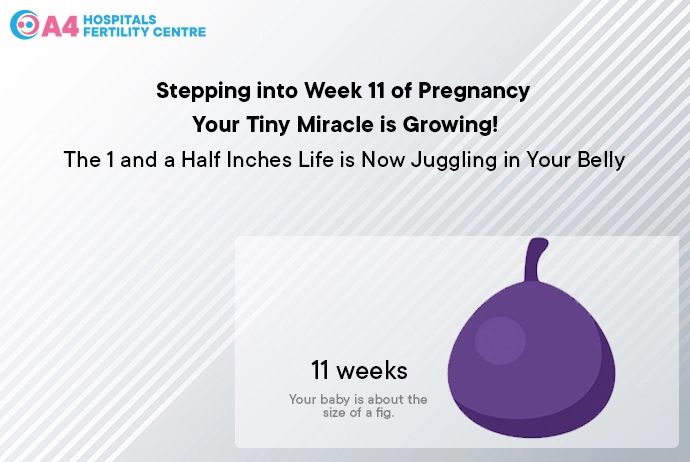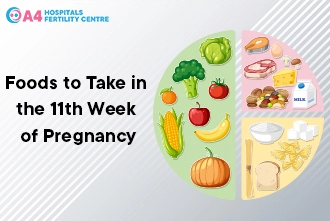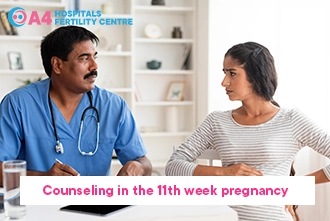
Dr. Aruna Ashok MBBS, MS OG, DNB OG
- Clinical Director

Welcome to week 11 of your pregnancy! At this stage, your baby is about the size of a fig, measuring approximately one and a half inches long. It's fascinating to think that something so small is already so active. The fingers and toes of your baby are no longer webbed, and they are starting to move around, though you won’t feel it just yet. The head is almost half the size of the body, making it look quite large, but this will balance out as your baby continues to grow.
The most exciting development this week is the formation of the diaphragm, which allows your baby to begin practicing breathing movements. These little “breaths” are crucial for lung development, preparing your baby for life outside the womb. Additionally, the tiny tooth buds are forming under the gums, and the bones are beginning to harden, making your baby stronger each day.
Your baby’s skin is still translucent, and you can see blood vessels underneath. Even though your baby is small, they are incredibly active, moving around in your womb. These movements are crucial for muscle and joint development. The brain is also growing rapidly, forming new neural pathways that will support your baby's future learning and movement skills.
At this stage, your baby’s kidneys are starting to produce urine, which will become part of the amniotic fluid. This process helps regulate the fluid balance around your baby, providing a cushion and protecting them as they move around. The digestive system is also maturing, with the intestines starting to move into the abdomen from the umbilical cord.
Remember, each pregnancy is unique. Your baby might be developing at their own pace, and that’s perfectly okay. It’s essential to keep up with your prenatal appointments to ensure everything is progressing well. Your doctor can provide personalized updates about your baby’s development and answer any questions you might have.
Feeling excited about your little one’s progress? It’s a remarkable journey, and you’re doing great! If you’re curious to learn more about what to expect in the coming weeks, A4 Fertility Centre offers comprehensive birthing classes. These classes provide valuable information and support, helping you navigate the different stages of pregnancy with confidence.


At 11 weeks, you might notice a variety of symptoms. This happens as your body continues to adapt to pregnancy. One common experience is fatigue. Your body is working hard to support your growing baby. It can leave you feeling more tired than usual. It’s essential to listen to your body and rest when needed. Short naps and early bedtimes can help you manage this fatigue.
Morning sickness may still be present, although it often starts to ease up around this time. If you’re still struggling with nausea, try eating small, frequent meals throughout the day. Intake foods that are bland and easy to digest. They can also help greatly. It is important to keep yourself hydrated. This is by drinking plenty of water, as dehydration can exacerbate nausea.
You might also notice changes in your skin. The hormones during pregnancy can cause your skin to become more oily or dry. Some women experience the “pregnancy glow,” where their skin looks more radiant, while others might deal with acne or other skin issues. Gentle skincare routines and products designed for sensitive skin can help manage these changes.
Another symptom you might experience is breast tenderness. Your breasts are preparing for breastfeeding, which can cause them to feel sore or swollen. Wearing a supportive bra can provide some relief. You may also notice that your nipples and areolas are becoming darker, which is a normal part of pregnancy.
Mood swings are common due to hormonal changes. You might find yourself feeling more emotional or experiencing rapid shifts in mood. It’s important to communicate with your partner or loved ones about how you’re feeling. Support from those around you can make a big difference in managing these emotional changes.
It’s also normal to experience digestive issues, such as constipation or bloating. Eating a high-fiber diet, drinking plenty of fluids, and staying active can help alleviate these symptoms. Gentle exercises, like walking or prenatal yoga, can keep your digestive system moving smoothly.
Experiencing any of these symptoms? Don’t worry; you’re not alone. Every pregnancy is different, and what you’re feeling is unique to you. If you have any concerns, reach out to your healthcare provider. They can offer advice and reassurance to help you through this stage.
Want to connect with other expectant mothers? A4 Fertility Centre’s birthing classes are a great place to meet others who are going through similar experiences. You’ll find a supportive community and learn valuable tips for a healthy pregnancy journey.
Eating a balanced diet is crucial during pregnancy, and week 11 is no exception. Your baby’s rapid growth requires a variety of nutrients to support their development. Focus on incorporating a mix of fruits, vegetables, proteins, and whole grains into your meals.
Protein is essential for your baby’s growth, especially for the development of muscles and tissues. Include sources of lean protein, such as chicken, fish, beans, and tofu. Fish like salmon are also rich in omega-3 fatty acids, which are important for your baby’s brain and eye development.
Fruits and vegetables should be a big part of your diet. They provide essential vitamins and minerals, as well as fiber, which can help with digestion. Leafy greens, like spinach and kale, are particularly beneficial due to their high content of folic acid and iron. Berries, oranges, and bananas are great choices for a healthy snack.
Whole grains are an excellent source of energy and provide important nutrients like fiber, B vitamins, and magnesium. Opt for brown rice, whole wheat bread, oats, and quinoa. These foods help keep your energy levels stable and support your baby’s growth.
Dairy products are another important part of your diet. They provide calcium and vitamin D, which are crucial for your baby’s bone development. If you’re lactose intolerant or prefer non-dairy options, look for fortified plant-based milks and yogurts.
Hydration is key during pregnancy. Aim to drink at least eight glasses of water a day. Staying hydrated helps with digestion, reduces the risk of urinary tract infections, and supports the increased blood volume needed during pregnancy.
It’s also important to be mindful of certain foods to avoid. Raw or undercooked meats and eggs, unpasteurized dairy products, and certain types of fish high in mercury should be avoided. These foods can pose risks to your baby’s health.
Feeling unsure about what to eat? Planning your meals can make a big difference. Consider preparing a weekly menu that includes a variety of nutrients. This can help you stay organized and ensure you’re getting everything you and your baby need.
If you’re looking for more personalized advice, A4 Fertility Centre offers nutritional counselling as part of their birthing classes. You’ll get tips from experts on how to maintain a healthy diet throughout your pregnancy, ensuring you and your baby are well-nourished.
Pregnancy can be a time of mixed emotions. You might feel excited and anxious at the same time. Counselling can be a valuable resource to help you navigate these feelings and prepare for the changes ahead. At 11 weeks, it’s a great time to consider seeking support if you’re feeling overwhelmed.
Counselling can provide a safe space to discuss your concerns and fears. It’s normal to worry about the health of your baby, the changes in your body, and the adjustments to your lifestyle. A counsellor can help you address these worries and develop coping strategies.
One common concern during pregnancy is managing stress. High levels of stress can impact both you and your baby. Techniques like mindfulness, meditation, and deep breathing exercises can help you stay calm and centered. Counsellors can guide you through these practices and tailor them to your needs.
Counselling can also help you and your partner navigate the changes in your relationship. Pregnancy can bring about new dynamics and responsibilities. Open communication is key to maintaining a healthy relationship. Counselling sessions can provide tools for effective communication and conflict resolution, ensuring you and your partner are on the same page.
It’s also beneficial to discuss your birth plan during counselling sessions. Understanding your options and preparing for different scenarios can reduce anxiety and empower you to make informed decisions. A counsellor can help you explore your preferences and develop a plan that aligns with your values and goals.
Feeling isolated? Group counselling or support groups can connect you with other expectant mothers. Sharing experiences and advice can be incredibly reassuring. You’ll find a community of women who understand what you’re going through and can offer support.
Wondering where to start? A4 Fertility Centre offers counselling services as part of their comprehensive birthing classes. These classes cover various aspects of pregnancy, from physical changes to emotional well-being. You’ll gain valuable insights and support, helping you feel more confident and prepared for motherhood.
At 11 weeks, several important tests can help ensure your pregnancy is progressing well. These tests provide valuable information about your baby’s development and your health, allowing for early detection of any potential issues.
One common test during this week is the first-trimester screening. This test includes a blood test and an ultrasound. The blood test measures levels of specific proteins and hormones in your blood, while the ultrasound checks the thickness of the nuchal fold at the back of your baby’s neck. These combined results can indicate the risk of chromosomal abnormalities, such as Down syndrome.
Another important test is the non-invasive prenatal testing (NIPT). This test analyzes small fragments of fetal DNA circulating in your blood. NIPT is highly accurate in detecting chromosomal conditions like Down syndrome, trisomy 18, and trisomy 13. It can also determine the baby’s sex early in the pregnancy. Since it's a blood test, it poses no risk to the baby.
Your healthcare provider might also recommend a chorionic villus sampling (CVS) if there's a higher risk of genetic conditions. This test involves taking a small sample of placental tissue to analyze for genetic abnormalities. CVS can provide definitive information but carries a small risk of miscarriage, so it's typically only recommended in specific situations.
Routine blood tests will also be conducted during this time to check for various conditions. These tests can include checking your blood type, Rh factor, and screening for infections such as HIV, hepatitis B, and syphilis. Blood tests also measure your hemoglobin and hematocrit levels to ensure you’re not anemic, which is common during pregnancy.
Urine tests are another routine part of prenatal care. These tests screen for protein, glucose, and signs of infection. High levels of protein in your urine might indicate preeclampsia, a condition that requires careful monitoring. Regular urine tests help ensure any potential issues are caught early.
Ultrasound scans play a crucial role at this stage. The first-trimester ultrasound helps confirm the gestational age of your baby, check for multiple pregnancies, and observe the baby's heartbeat and physical development. This scan is an opportunity to see your baby moving and to hear their heartbeat, which can be a reassuring and exciting experience.
Feeling overwhelmed by all these tests? It’s normal to have questions and concerns. Each test is designed to provide information that helps you and your healthcare provider ensure the best care for you and your baby. Don't hesitate to ask your doctor about the purpose of each test and what the results might mean for your pregnancy.
Interested in more support? A4 Fertility Centre’s birthing classes offer a comprehensive guide to prenatal testing. You’ll learn about the different tests, what they involve, and how to prepare for them. This information can help you feel more in control and confident as you navigate this stage of your pregnancy.